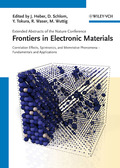Frontiers in Electronic Materials
Correlation Effects, Spintronics, and Memristive Phenomena - Fundamentals and Applications

1. Auflage Juli 2012
692 Seiten, Softcover
Monographie
Kurzbeschreibung
A collection of extended abstracts from the latest fundamental as well as application-oriented research, as presented at Frontiers in Electronic Materials, a Nature conference on correlation effects and memristive phenomena, held in Aachen in 2012.
Jetzt kaufen
Preis: 199,00 €
Preis inkl. MwSt, zzgl. Versand
Euro-Preise für Wiley-VCH- und Ernst & Sohn-Titel sind nur für Deutschland gültig. In EU-Ländern gilt die lokale Mehrwertsteuer. Portokosten werden berechnet.
- Gedruckte Ausgabe vergriffen -
This collection of extended abstracts summarizes the latest research as presented at "Frontiers in Electronic Materials", a Nature conference on correlation effects and memristive phenomena, which took place in 2012.
The contributions from leading authors from the US, Japan, Korea, and Europe discuss breakthroughs and challenges in fundamental research as well as the potential for future applications.
Hot topics covered include:
- Electron correlation and unusual quantum effects
- Oxide heterostructures and interfaces
- Multiferrroics, spintronics, ferroelectrics and flexoelectrics
- Processing in nanotechnology
- Advanced characterization techniques
- Superionic conductors, thermoelectrics, photovoltaics
- Chip architectures and computational concepts
An essential resource for the researchers of today and tomorrow.
Oxide heterostructures and interfaces
Multiferrroics, spintronics, ferroelectrics and flexoelectrics
Memristive phenomena: Phase change materials and nanoionic redox systems
Energy conversion: Superionic conductors, thermoelectrics, photovoltaics
Information technology: Chip architectures and computational concepts
Nanotechnology: Atomic layer deposition, physical layer deposition, novel patterning techniques
Advanced characterization: Spectroscopy, microscopy, scanning probe methods
Theory and Modelling: first principle methods, molecular dynamics, multiscale simulation
Darrell Schlom is the Hebert Fisk Johnson Professor of Industrial Chemistry in the Department of Materials Science and Engineering at Cornell University. He is currently the chair of the Division of Materials Physics of the American Physical Society (APS). The focus of his research is the heteroepitaxial growth of oxide films by molecular-beam epitaxy. Darrell Schlom has published over 400 papers. He was elected Fellow of both APS and the Materials Research Society (MRS) and received an Alexander von Humboldt Research Fellowship and the MRS Medal.
Yoshinori Tokura is Professor of Applied Physics at the University of Tokyo since 1994. Since 2007, he is also Group Director of RIKEN Advanced Science Institute. He has been investigating transition-metal oxide materials that exhibit strong electron correlation. With his research on giant magnetoelectric responses from multiferroics he extraordinarily contributed to the present knowledge on this topic. Professor Tokura was multiply awarded for his research achievements, among others with the Nishina Memorial Prize, Matthias Prize, Asahi Prize, MacGroddy Prize, and Fujihara Prize for correlated electron research.
Rainer Waser is Professor at the faculty for Electrical Engineering and Information Technology at the RWTH Aachen University and director at the Peter Grünberg Institute at the Forschungszentrum Jülich (FZJ), Germany. His research group is focused on fundamental aspects of electronic materials and on such integrated devices as nonvolatile memories, logic devices, sensors and actuators. Rainer Waser has published about 500 technical papers. Since 2003, he has been the coordinator of the research program on nanoelectronic systems within the Germany national research centres in the Helmholtz Association. In 2007, he has been co-founder of the Jülich-Aachen Research Alliance, section Fundamentals of Future Information Technology (JARA-FIT).
Matthias Wuttig is Professor for Physics of New Materials at the University of Aachen since 1997, and holds a JARA Professorship at Research Centre Jülich & RWTH Aachen since 2011. He served as Dean of the Faculty of Mathematics, Informatics and Natural Sciences, and is Speaker of the strategy board of RWTH Aachen. He has been visiting professor in China, Kenya, USA, and Singapure. His research on phase change memories and organic thin films has been awarded several times, among others with the Heinz-Maier-Leibnitz Prize of the Ministry for Education and Science, the Gaede-Prize of the German Vacuum Society, and the Stanford R. Ovshinsky Prize. Since 2009, Matthias Wuttig is Einstein Professor at the Chinese Academy of Sciences.


